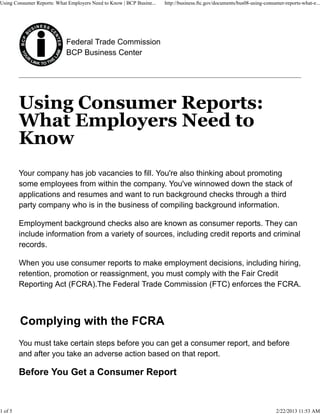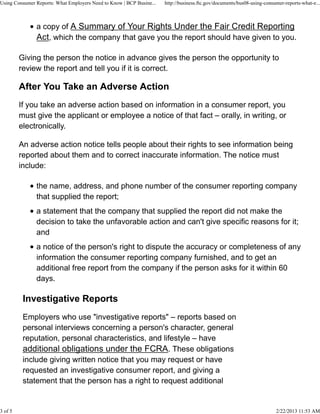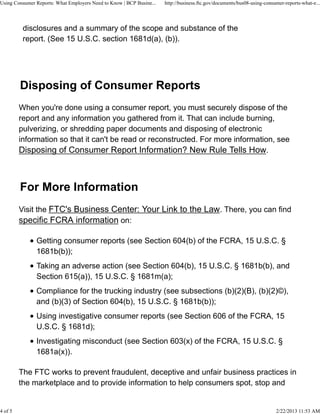Using consumer reports: What employers need to know
- 1. Using Consumer Reports: What Employers Need to Know | BCP Busine... http://business.ftc.gov/documents/bus08-using-consumer-reports-what-e... Federal Trade Commission BCP Business Center Your company has job vacancies to fill. You're also thinking about promoting some employees from within the company. You've winnowed down the stack of applications and resumes and want to run background checks through a third party company who is in the business of compiling background information. Employment background checks also are known as consumer reports. They can include information from a variety of sources, including credit reports and criminal records. When you use consumer reports to make employment decisions, including hiring, retention, promotion or reassignment, you must comply with the Fair Credit Reporting Act (FCRA).The Federal Trade Commission (FTC) enforces the FCRA. Complying with the FCRA You must take certain steps before you can get a consumer report, and before and after you take an adverse action based on that report. Before You Get a Consumer Report 1 of 5 2/22/2013 11:53 AM
- 2. Using Consumer Reports: What Employers Need to Know | BCP Busine... http://business.ftc.gov/documents/bus08-using-consumer-reports-what-e... You must: Tell the applicant or employee that you might use information in their consumer report for decisions related to their employment. This notice must be in writing and in a stand-alone format. The notice cannot be in an employment application. You can include some minor additional information in the notice, like a brief description of the nature of consumer reports, but only if it does not confuse or detract from the notice. Get written permission from the applicant or employee. This can be part of the document you use to notify the person that you will get a consumer report. If you want the authorization to allow you to get consumer reports throughout the person's employment, make sure you say so clearly and conspicuously. Certify compliance to the company from which you are getting the applicant or employee's information. You must certify that you: notified the applicant or employee and got their permission to get a consumer report; complied with all of the FCRA requirements; and will not discriminate against the applicant or employee or otherwise misuse the information, as provided by any applicable federal or state equal opportunity laws or regulations. It's a good idea to review applicable laws of your state related to consumer reports. Some states restrict the use of consumer reports – usually credit reports – for employment purposes. Before You Take an Adverse Action Before you reject a job application, reassign or terminate an employee, deny a promotion, or take any other adverse employment action based on information in a consumer report, you must give the applicant or employee: a notice that includes a copy of the consumer report you relied on to make your decision; and 2 of 5 2/22/2013 11:53 AM
- 3. Using Consumer Reports: What Employers Need to Know | BCP Busine... http://business.ftc.gov/documents/bus08-using-consumer-reports-what-e... a copy of A Summary of Your Rights Under the Fair Credit Reporting Act, which the company that gave you the report should have given to you. Giving the person the notice in advance gives the person the opportunity to review the report and tell you if it is correct. After You Take an Adverse Action If you take an adverse action based on information in a consumer report, you must give the applicant or employee a notice of that fact – orally, in writing, or electronically. An adverse action notice tells people about their rights to see information being reported about them and to correct inaccurate information. The notice must include: the name, address, and phone number of the consumer reporting company that supplied the report; a statement that the company that supplied the report did not make the decision to take the unfavorable action and can't give specific reasons for it; and a notice of the person's right to dispute the accuracy or completeness of any information the consumer reporting company furnished, and to get an additional free report from the company if the person asks for it within 60 days. Investigative Reports Employers who use "investigative reports" – reports based on personal interviews concerning a person's character, general reputation, personal characteristics, and lifestyle – have additional obligations under the FCRA. These obligations include giving written notice that you may request or have requested an investigative consumer report, and giving a statement that the person has a right to request additional 3 of 5 2/22/2013 11:53 AM
- 4. Using Consumer Reports: What Employers Need to Know | BCP Busine... http://business.ftc.gov/documents/bus08-using-consumer-reports-what-e... disclosures and a summary of the scope and substance of the report. (See 15 U.S.C. section 1681d(a), (b)). Disposing of Consumer Reports When you're done using a consumer report, you must securely dispose of the report and any information you gathered from it. That can include burning, pulverizing, or shredding paper documents and disposing of electronic information so that it can't be read or reconstructed. For more information, see Disposing of Consumer Report Information? New Rule Tells How. For More Information Visit the FTC's Business Center: Your Link to the Law. There, you can find specific FCRA information on: Getting consumer reports (see Section 604(b) of the FCRA, 15 U.S.C. § 1681b(b)); Taking an adverse action (see Section 604(b), 15 U.S.C. § 1681b(b), and Section 615(a)), 15 U.S.C. § 1681m(a); Compliance for the trucking industry (see subsections (b)(2)(B), (b)(2)©), and (b)(3) of Section 604(b), 15 U.S.C. § 1681b(b)); Using investigative consumer reports (see Section 606 of the FCRA, 15 U.S.C. § 1681d); Investigating misconduct (see Section 603(x) of the FCRA, 15 U.S.C. § 1681a(x)). The FTC works to prevent fraudulent, deceptive and unfair business practices in the marketplace and to provide information to help consumers spot, stop and 4 of 5 2/22/2013 11:53 AM
- 5. Using Consumer Reports: What Employers Need to Know | BCP Busine... http://business.ftc.gov/documents/bus08-using-consumer-reports-what-e... avoid them. To file a complaint or get free information on consumer issues, visit ftc.gov or call toll-free, 1-877-FTC-HELP (1-877-382-4357); TTY: 1-866-653-4261. Watch a video, How to File a Complaint, to learn more. The FTC enters consumer complaints into the Consumer Sentinel Network, a secure online database and investigative tool used by hundreds of civil and criminal law enforcement agencies in the U.S. and abroad. Your Opportunity to Comment The National Small Business Ombudsman and 10 Regional Fairness Boards collect comments from small businesses about federal compliance and enforcement activities. Each year, the Ombudsman evaluates the conduct of these activities and rates each agency's responsiveness to small businesses. Small businesses can comment to the Ombudsman without fear of reprisal. To comment, call toll-free 1-888-REGFAIR (1-888-734-3247) or go to www.sba.gov/ombudsman. January 2012 5 of 5 2/22/2013 11:53 AM





